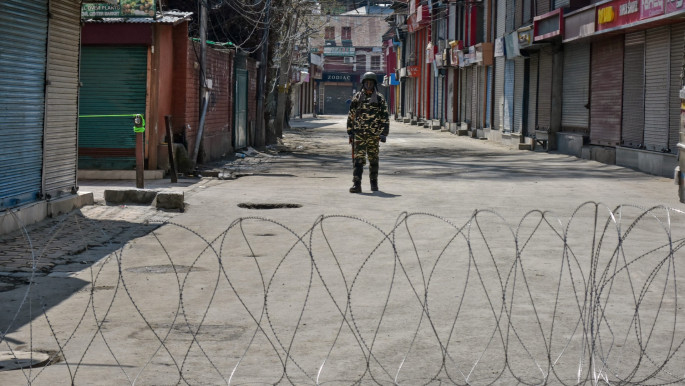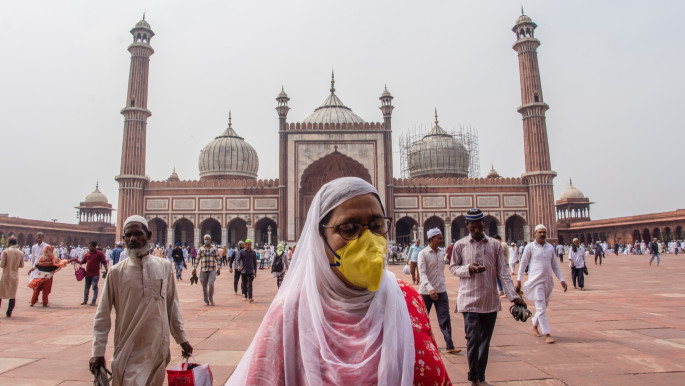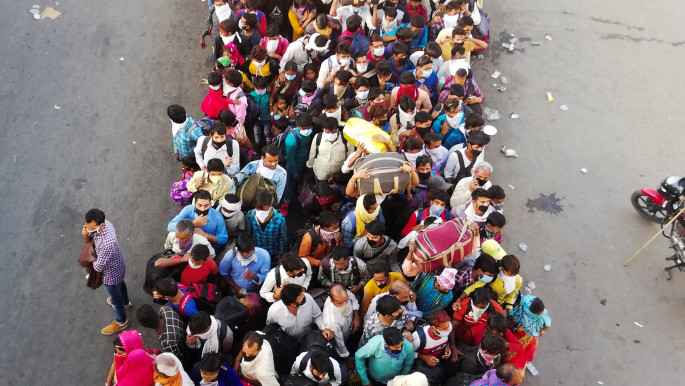'Palestine in the making': India's new Kashmir domicile law mirrors Israel's settler-colonial blueprint
The new domicile law announced by India's Ministry of Home Affairs on 1 April grants permanent residency rights, which entails owning and buying property and access to government jobs, for anyone who has resided in Indian-administered Kashmir for a period of 15 years.
The move has sparked anger in the contested region, with civilians from a range of political opinions questioning its intent and timing. Many believe India has taken advantage of the coronavirus pandemic to permanently change Kashmir's demographics.
"The duplicitous Indian state is using the Covid-19 quarantine to peddle its nefarious agenda, which no doubt is to usher in demographic change," Ather Zia, an assistant professor in anthropology at the University of Northern Colorado, told The New Arab.
The decision by India's Hindu nationalist government, led by Narendra Modi, comes at a time when there is widespread anxiety following the implementation of a 21-day lockdown to contain the coronavirus.
"This clearly shows they want to hoodwink people at a time when they cannot even think in their right minds given the magnitude of the Covid-19 epidemic," the National Conference (NC), one of the region's main political parties, said in a statement.
 |
|
| Read more: Emerging from brutal Indian clampdown, Kashmir braces for coronavirus |
Who is now eligible for residency?
Permanent residency rights will also apply to central government officials who have served in Jammu and Kashmir for 10 years, and their children.
In the initially introduced law, residents of Indian-administered Kashmir were given reservations in only low-level jobs, however, on 3 April – two days after the new law was introduced – New Delhi amended its order.
Following a backlash from the Hindu-dominated Jammu Province, including from the Bharatiya Janata Party (BJP) and the newly formed Jammu and Kashmir Apni Party (JKAP), the law was changed to reserve all types of jobs for domiciles.
JKAP, led by Altaf Bukhari, is supported by the BJP and was formed to sideline the likes of former chief ministers Omar Abdullah and Mehbooba Mufti, critics say. The party came into existence when Kashmir was under clampdown last month and most of the mainstream political leaders were in jail.
Analysts say the introduction of the new domicile law and its subsequent amendment was a pre-planned act by the BJP to give political leeway to the newly formed JKAP and placate the BJP's own constituency in Jammu's Hindu-dominated districts.
 |
Comparing the new domicile law with settlements in the occupied West Bank, residents and critics said India is copying the Israeli model in Kashmir |  |
Even so, the new definition of the 'domicile' remains unchanged, opening the door for Indian citizens to permanently reside and buy land in Indian-administered Kashmir.
Before India stripped Kashmir of its semi-autonomous status in August 2019, Article 35A, now abrogated, empowered the Jammu and Kashmir legislature to define the state's permanent residents and their special rights and privileges.
It barred non-residents from permanent settlement and acquiring immovable property, government jobs, scholarships and aid.
Comparisons with Israel's colonial project
"India wants to implement Israel's settler-colonial project in Kashmir. Ten to 15 years down the line our territory will be like Palestine," Arif Rasheed, a local student, told The New Arab.
"Over the past seven decades, India has robbed us, strangled our aspirations, and now our land, culture, environment and identity are in danger."
Comparing the new domicile law with settlements in the occupied West Bank, residents and critics said India is copying the Israeli model in Kashmir.
 |
|
| Read more: India's coronavirus outbreak unmasks the ugly face of Islamophobia |
"It fits very well within the BJP's Hindu-nationalist agenda whereby they see a Muslim-majority area as an impediment to establishing a Hindu-majoritarian state," a Kashmiri scholar, who wished to remain anonymous for fear of government reprisal, told The New Arab.
"In short, the domicile law fulfils two goals - colonisation of Kashmir and Hindu-majoritarian transformation of India."
Read more: What's happening in Kashmir looks a lot like Israel's rule over Palestine
The law is thought to incentivise settlement in the region to alter the demographic make-up and ultimately force Kashmiris to forfeit their political demands.
"Settler colonialism has become a reality after the fear of it was looming on Kashmir for the last 72 years," Ather Zia, an assistant professor in anthropology at the University of Northern Colorado, told TNA.
"The laws that have already been enacted are symbolic Indian colonialism and neo-colonial plunder of the resources".
 |
In short, the domicile law fulfils two goals - colonisation of Kashmir and Hindu-majoritarian transformation of India |  |
With the Covid-19 lockdown preventing people from protesting, residents have gone online to express their anger at New Delhi.
However, on 2 April, Inspector General of the Jammu & Kashmir Police asked people to refrain from posting anything on social media that could be considered "instigation", warning there would be punishment for those who violated the rules.
Cyber police would be responsible for trawling social media content, the police chief added.
"There is not an iota of doubt that the domicile law will change the demography of J&K and will essentially rob the rights of locals to jobs here," the National Conference (NC) party said.
"From abrogation of Article 370 to reducing it to a union territory (UT), people have been subjected to agony, mental trauma and an unending cycle of worries about themselves and their children."
 |
|
| Read more: The long walk home: Modi's coronavirus lockdown triggers mass exodus of India's desperate migrant workers |
International condemnation
Pakistani Prime Minister Imran Khan took to Twitter to condemn India's move, calling it an attempt to alter the territory's demography.
"The new Jammu and Kashmir Reorganization Order 2020 is a clear violation of the 4th Geneva Convention," Khan tweeted. "Pakistan will continue to expose Indian state terrorism & it's denial of the Kashmiris right to self-determination."
"Timing of this latest illegal action is particularly reprehensible because it seeks to exploit the international focus on COVID19 pandemic to push forward BJP's Hindutva Supremacist agenda."
The Independent Permanent Human Rights Commission, an advisory body of the Organisation for Islamic Cooperation (OIC), condemned India's new domicile laws for Indian-administered Kashmir, calling them "draconian" and a "violation" of international and humanitarian laws.
Kashmir continues to be one of the longest unresolved conflicts, with India and Pakistan, both nuclear states, claiming the region in full and fighting multiple wars over its possession.
Aamir Ali Bhat is a Kashmir-based freelance journalist who reports on human rights abuses, culture and the environment. He writes for The New Arab, Kashmir Ink and Free Press Kashmir.
Follow him on Twitter: @Aamirbhatt3


![President Pezeshkian has denounced Israel's attacks on Lebanon [Getty]](/sites/default/files/styles/image_684x385/public/2173482924.jpeg?h=a5f2f23a&itok=q3evVtko)



 Follow the Middle East's top stories in English at The New Arab on Google News
Follow the Middle East's top stories in English at The New Arab on Google News


